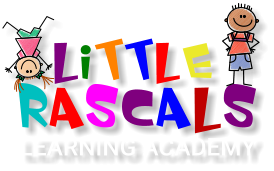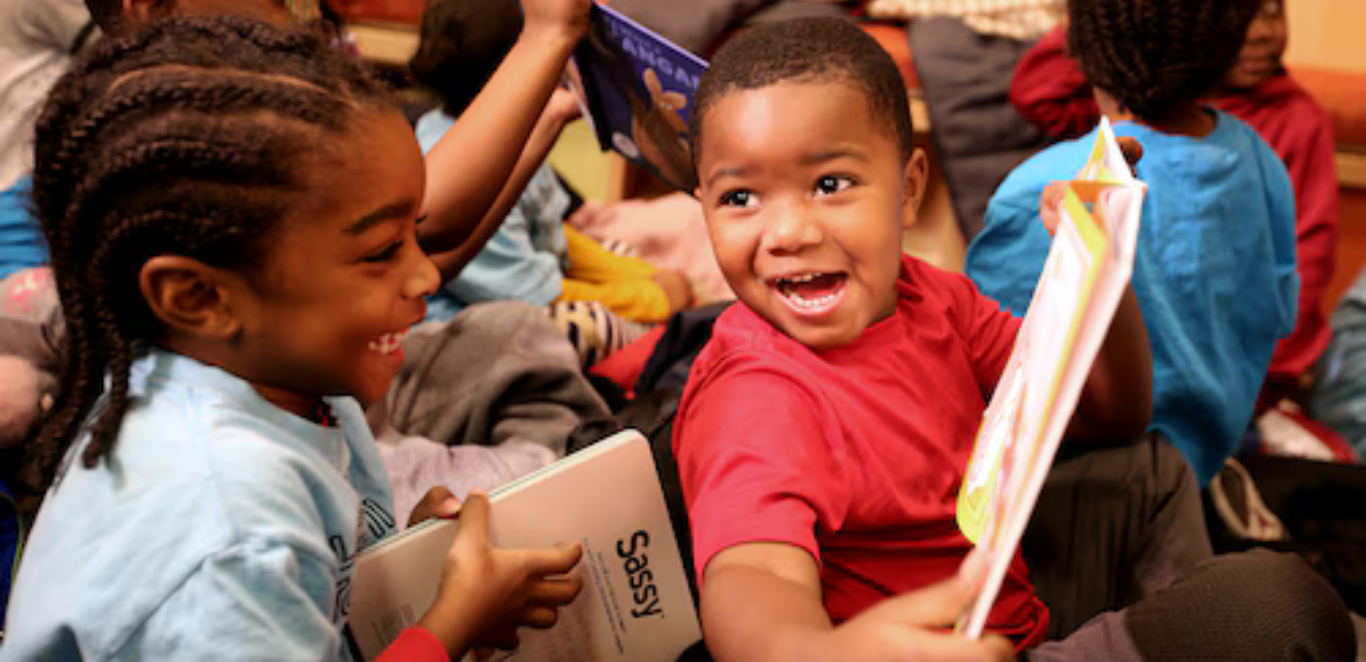
INFANTS
The infant room is a pivotal environment that caters to the development and care of children
aged six weeks to about 12 months. It is specifically designed to provide a safe, nurturing,
and stimulating atmosphere for the youngest members of our society. Caregivers in this room
are specially trained to cater to the unique needs of infants, focusing on their physical,
emotional, and cognitive development. Each day is structured around typical routines, such
as feeding, diaper changes, naptime, and play, which are critical for establishing a sense of
security and regularityfor the infants.
In the infant room, caregivers engage in various activities that promote sensory and motor
skills. The room is filled with age-appropriate toys that encourage exploration and interaction,
such as soft blocks, rattles, and colorful mobiles. Caregivers often read to the infants, sing
songs, and play games that involve clapping or waving, which stimulates auditory and visual
development. These interactions are not only crucial for physical growth but also help infants
develop social bonds and begin recognizing familiar faces and voices. In essence, the infant
room serves as a foundational building block for growth and development during an
incredibly formative period in their young lives.
TODDLERS
The toddler room fosters early childhood development through structured activities and
unstructured play. Children aged one to three experience significant growth during this stage.
In the toddler room, caregivers and educators create a nurturing space where toddlers can
explore their surroundings while encouraging social, emotional, cognitive, and physical
development. From the moment the toddlers enter the room, they are welcomed with
engaging activities designed to stimulate their curiosity and creativity, promoting an
atmosphere of learning through play.
Storytime is another important component, where caregivers read aloud to the children, helping
them develop language skills and an appreciation for books. Group activities like singing,
dancing, and simple games promote social skills such as sharing and cooperation, while also
allowing toddlers to practice cognitive skills such as following directions and taking turns.
By modeling appropriate responses to various feelings and helping toddlers articulate their
emotions, caregivers teach essential emotional regulation skills. Throughout the day, the
supportive and responsive interactions in the toddler room not only enhance a child's individual
growth but also lay the groundwork for positive social interactions and a lifelong love for
learning. Overall, the toddler room provides a rich tapestry of exploration, socialization, and
emotional growth, setting the stage for future educational experiences.
PRE-SCHOOL
In this setting, children learn to cooperate with one another, share resources, and communicate
their ideas. Through imaginative play, they explore different roles, which helps them understand
the world around them. This playful learning approach is backed by a wealth of research
showing that children who engage in play-based learning are more likely to succeed
academically later on.
The preschool classroom plays a crucial role in fostering social and emotional development.
Children acquire skills to build relationships, resolve disputes, and communicate their emotions
effectively. When conflicts occur, teachers assist children in navigating the resolution process
by encouraging them to express their feelings and listen attentively to others. Additionally,
educators provide children with strategies for emotional regulation. Methods like deep-
breathing exercises or utilizing designated 'calm-down' areas enable children to handle their
emotions better, reinforcing the idea that feeling upset is normal and that there are positive
ways to cope with such feelings.
The experiences children have in our preschool classroom are foundational for their future
learning. Through structured routines, interactive play, and supportive relationships, children
develop essential skills that will serve them throughout their educational journeys.
AFTERCARE
Our aftercare program is structured to cater to the needs of children after the traditional school
day ends. Here, children have the opportunity to transition from the academic environment to a
more relaxed and creatively stimulating atmosphere. This programs is essential for working
parents who need reliable care for their children while they finish their workday.
Upon arrival, children are welcomed into a warm and inviting environment. Staff members
greet each child and treat them to a nutritious snack This time not only nourishes their bodies
but also serves as a social gathering where they can share their experiences from the day.
Staff members encourage conversations, helping children develop their language and listening
skills.
Our aftercare program also offers homework assistance, allowing children to complete
assignments in a supportive environment. This academic support helps reinforce what they
learn during school hours and can lead to improved academic performance.
5099 UNION BOULEVARD
SAINT LOUIS, MISSOURI 63115
DVN#002552634
Visit us today
to learn more
about our services
and how we can
support your child’s
development.
Our Infants program goes so far beyond regular
daycare. Here, babies are made to feel safe
secure, and happy. This class gives warm,
caring teachers an opportunity to bond and
develop trust with little ones. Each child has a
primary caregiver who will guide your child’s
development and be your main point of contact.
In this classroom, children will enjoy:
•
Warm, nurturing classroom environments
•
Stimulating activities with educational toys
•
Exclusive milestone-based curriculum
•
Immersive learning
These energetic little ones are growing and
learning, so we channel their energy into
positive learning moments by giving them
ample room to move and explore. Here,
toddlers receive encouragement and
guidance toward the growth of their physical
skills and emerging milestones:
•
Stimulating classroom environments
•
Exclusive milestone-based curriculum
•
Immersive learning experiences
•
Educational toys and activities
A mobile, energetic 2-year-old enjoys the
entire world as their playground. We’ve put
together a unique educational approach that
focuses their enthusiasm into opportunities
for development, growth, and achievement.
Here, 2-year-olds enjoy:
•
Exclusive milestone-based curriculum
•
Interactive, tactile learning experiences
•
Stimulating material environments
For active learners, Preschool is a crucial
stop on the journey toward elementary
school and future academic success. Active,
hands-on early childhood learning
experiences guide children’s development in
key school readiness skills. Our Preschool
program is centered on:
•
Building independence
•
Collaboration and communication skills
•
Hands-on learning
•
Literacy and number concepts
•
Problem-solving
•
Careful and responsive listening
•
Implementing language in learning
•
Collaborative social skills

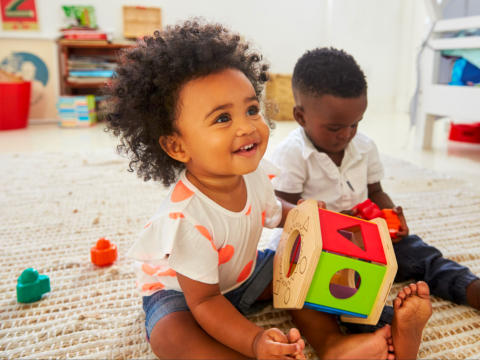
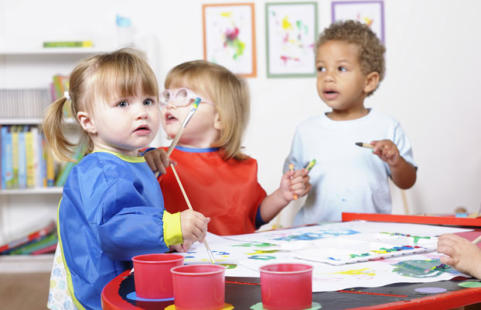
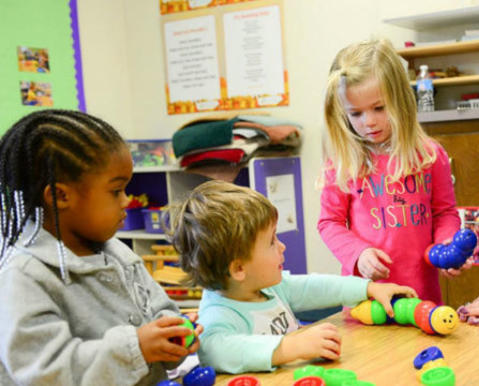
HOURS
MONDAY - FRIDAY
5:30 AM - 6 PM
5099 UNION BOULEVARD
SAINT LOUIS, MISSOURI 63115
DVN#002552634
VISIT US!

